Kingdoms in Biology
In biology, a kingdom is a taxonomic rank that is composed of smaller groups called phyla (or divisions, in the case of plants). The current system of classification recognizes five kingdoms: Animalia, Plantae, Fungi, Protista, and Monera (or Prokaryotae).
Animalia Kingdom
The Animalia kingdom includes all animals. These are multicellular, eukaryotic organisms that are heterotrophic, meaning they obtain their nutrients by consuming other organisms. They are further classified into various phyla based on their characteristics and evolutionary relationships.
Plantae Kingdom
The Plantae kingdom encompasses all plants. These are multicellular, eukaryotic organisms that are autotrophic, meaning they produce their own food through photosynthesis. They include a wide variety of organisms, from small mosses to large trees.
Fungi Kingdom
The Fungi kingdom consists of organisms such as mushrooms, molds, and yeasts. These are eukaryotic organisms that are mostly multicellular (though some are unicellular) and obtain nutrients through absorption. They play important roles in decomposition and nutrient cycling in ecosystems.
Protista Kingdom
The Protista kingdom is a diverse group that includes various single-celled eukaryotic organisms such as algae, amoebas, and ciliates. Some members of this kingdom exhibit plant-like characteristics, while others resemble animals. The classification of protists is still a subject of ongoing research and debate.
Monera Kingdom
The Monera kingdom, also referred to as Prokaryotae, consists of prokaryotic organisms such as bacteria and archaea. These organisms are unicellular and lack a true nucleus. They are found in a wide range of habitats and play crucial roles in various ecological processes.
Study Guide
- What are the five kingdoms of life in biology?
- How do organisms in the Animalia kingdom obtain nutrients?
- What is the primary mode of nutrition for organisms in the Plantae kingdom?
- What are some examples of organisms in the Fungi kingdom?
- What is a key characteristic of organisms in the Monera kingdom?
- Why is the classification of protists challenging?
◂Science Worksheets and Study Guides Sixth Grade. Birds and Mammals
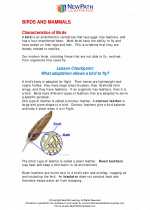
 Activity Lesson
Activity Lesson
 Worksheet/Answer key
Worksheet/Answer key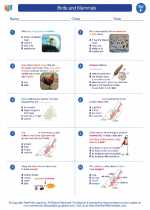
 Worksheet/Answer key
Worksheet/Answer key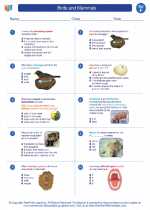
 Worksheet/Answer key
Worksheet/Answer key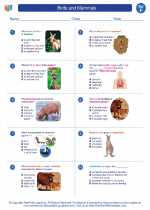
 Worksheet/Answer key
Worksheet/Answer key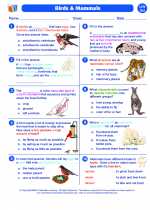
 Vocabulary/Answer key
Vocabulary/Answer key
 Vocabulary/Answer key
Vocabulary/Answer key
 Vocabulary/Answer key
Vocabulary/Answer key
 Vocabulary/Answer key
Vocabulary/Answer key
 Vocabulary/Answer key
Vocabulary/Answer key
